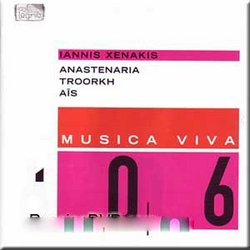| All Artists: Spyros Sakkas, Iannis Xenakis, Charles Zachary Bornstein, Michel Tabachnik, Peter Rundel, Bavarian Radio Symphony Orchestra, Sinfonie-Orchester des Bayersichen Rundfunks Title: Iannis Xenakis: Anastenaria; Troorkh; Aïs Members Wishing: 2 Total Copies: 0 Label: Col Legno Original Release Date: 1/1/2003 Re-Release Date: 7/29/2003 Genres: Pop, Classical Styles: Vocal Pop, Opera & Classical Vocal, Forms & Genres, Concertos, Symphonies Number of Discs: 1 SwapaCD Credits: 1 UPC: 675754631024 |
Search - Spyros Sakkas, Iannis Xenakis, Charles Zachary Bornstein :: Iannis Xenakis: Anastenaria; Troorkh; Aïs
 | Spyros Sakkas, Iannis Xenakis, Charles Zachary Bornstein Iannis Xenakis: Anastenaria; Troorkh; Aïs Genres: Pop, Classical
|
Larger Image |
CD Details |
CD ReviewsSuccessful Xenakis archaeology R. Hutchinson | a world ruled by fossil fuels and fossil minds | 01/25/2004 (5 out of 5 stars) ""Musica Viva 06" is another excellent release from the German Col Legno label, which specializes in the avant-garde. This disc includes three live performances -- the original 1981 recording of "Ais," featuring the incredible baritone voice of Spyros Sakkas, a new recording of "Troorkh," a trombone concerto, from 2000, and (drumroll please...) the world premiere of "Anastenaria," also from 2000, with the inimitable Xenakis champion Charles Bornstein conducting. As it turns out, "Metastaseis," Xenakis's famous work which had its first performance (and recording) in October of 1955 was originally conceived as the conclusion of a triptych. However, "Metastaseis" represented such a radical departure from the preceding parts that Xenakis quickly moved to further develop the new direction, which he came to call "stochastic music," and left the earlier two parts behind. He never did look back, but now Bornstein has rescued the entire "Anastenaria" cycle. It is masterfully done, but I admit to feeling let down -- Xenakis was right, it's "Metastaseis" that is truly amazing. Part 1 features vocals, and Part II is orchestral. Apparently Part II, "Le Sacrifice," shows Xenakis working with serialism, but as he developed his own stochastic language, he left serialism behind. In its own right this is a fine Xenakis disc. "Troorkh" with Mike Svoboda is outstanding. However, I have heard other recordings of both "Ais" and "Metastaseis" -- what of these? Sakkas recently recorded "Ais" again with Arturo Tamayo on the Timpani label -- it's the opening track on "Orchestral Works, Volume One" (see my review). His voice seems to be much weaker 20 years later, or he had an off night. This original recording is much, much better. The orchestra is stronger and more decisive as well. The first public performance of "Metastaseis" in 1955 was captured live, and is included on the Col Legno Collage disc of Xenakis, "Orchestral Works and Chamber Music -- Collage 04" (see my review). I read somewhere that Xenakis thought this performance, with Hans Rosbaud and the SWF Symphony Orchestra, was never matched. Based on the three performances I've heard, I have to agree. "Metastaseis" opens with an eerie rising glissando from the strings -- it rises in pitch and intensity to a climax, followed by a pause, and then the strings begin sawing madly at double fortissimo. In the Rosbaud version, the climax before the pause builds up incredible tension, which is maintained throughout. In Bornstein's version, this opening simply misses the tension and so does not unleash the rest of the work with the same intensity. I would say that of the two Col Legno discs, "Orchestral Works" (Collage #4) is still the best introduction to Xenakis. In conclusion, my regards to Charles Bornstein for his dedication and his archaeological work, and thanks to Col Legno and all its supporters for making this music available."
|

 Track Listings (5) - Disc #1
Track Listings (5) - Disc #1